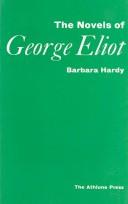| Listing 1 - 2 of 2 |
Sort by
|

ISBN: 0485120054 9786611291730 1281291730 1847141722 9780485120059 9781847141729 Year: 1973 Publisher: London: Athlone,
Abstract | Keywords | Export | Availability | Bookmark
 Loading...
Loading...Choose an application
- Reference Manager
- EndNote
- RefWorks (Direct export to RefWorks)
The whole book must be carefully read by everyone concerned with form in the novel' Nineteenth-century Fiction
Fiction --- Literary form --- Women and literature --- Roman --- Genres littéraires --- Femmes et littérature --- Technique --- History --- Histoire --- Eliot, George, --- Criticism and interpretation --- Didactic fiction, English --- English language --- History and criticism. --- Rhetoric. --- Technique. --- Criticism and interpretation. --- English literature. --- British literature --- Inklings (Group of writers) --- Nonsense Club (Group of writers) --- Order of the Fancy (Group of writers) --- Cross, Marian Evans, --- Evans, Marian, --- Eliot, Džordž, --- Ėliot, Dzhordzh, --- Cross, Mary Ann, --- Lewes, M. E. --- Lewes, Marian Evans, --- Elliŏtʻū, Choji, --- Eliyaṭ, Jārj, --- Evans, Mary Anne, --- אליוט, ג׳ַַורג׳ --- אליוט, ג׳ורג׳, --- עליאט, דזשארדזש --- עליאט, דזשארדזש, --- עליוט ג׳יארג׳, --- עליוט, גי׳ארג׳, --- עליוט, ג׳רארג׳, --- Women and literature - England - History - 19th century. --- Didactic fiction, English - History and criticism. --- English language - 19th century - Rhetoric. --- Fiction - Technique. --- Literary form - History - 19th century. --- Eliot, George, - 1819-1880 - Technique. --- Eliot, George, - 1819-1880
Book
ISBN: 1474211321 1283272393 9786613272393 1441197826 9781441197825 9781283272391 9780826495266 0826495265 9781847064592 1847064590 9781474211321 6613272396 Year: 2008 Publisher: London New York Continuum
Abstract | Keywords | Export | Availability | Bookmark
 Loading...
Loading...Choose an application
- Reference Manager
- EndNote
- RefWorks (Direct export to RefWorks)
Charles Dickens's experience and imagining of creativity is at the heart of his self-awareness, subject-matter and narrative. His intelligence works intuitively rather than conceptually and ideas about imagination often emerge informally in personal letters and implicitly through characters, language and story. His self-analysis and reflexive tendency are embedded in his styles and forms of narrative and dialogue, images of normality, madness, extremity, subversion and disorder, poetry and inter-textuality, anticipating and shaping the languages of modernism, influencing James Joyce and Virginia Woolf as well as traditionalists like H.G. Wells and Evelyn Waugh. Discussing Dickens's novels and some of his letters, sketches, essays and stories, Barbara Hardy offers a fascinating demonstration of creativity.
Imagination in literature. --- Creation (Literary, artistic, etc.) --- Creative ability in art --- Creative ability in literature --- Art --- Imagination --- Inspiration --- Literature --- Creative ability --- Originality --- Dickens, Charles, --- Dickens, Charles --- Dikensi, Čʻarlz, --- Dickens, Karol, --- Dikens, Charlz, --- Ti-keng-ssu, --- Digengsi, --- Dikkens, Charlz, --- Dikensas, Čarlzas, --- Ṭikkan̲s, Cārls, --- Ṭikkan̲cu, Cārlacu, --- Ṭikkan̲s, Cārlas, --- Диккенс, Чарлз, --- דיקינס, צ׳רלס, --- דיקנס, ַ צ׳רלז --- דיקנס, טשרלס --- דיקנס, צ׳רלז, --- דיקנס, צ׳רלס --- דיקנס, צ׳רלס, --- דיקענס, טש --- דיקענס, טשארלז --- דיקענס, טשארלז, --- דיקענס, טש., --- דיקקענס, טשארלז --- טשרלס, דיקנס --- チャールズ.ディケンズ, --- 狄更斯查尔斯, --- Boz, --- Sparks, Timothy, --- Criticism and interpretation.
| Listing 1 - 2 of 2 |
Sort by
|

 Search
Search Feedback
Feedback About UniCat
About UniCat  Help
Help News
News